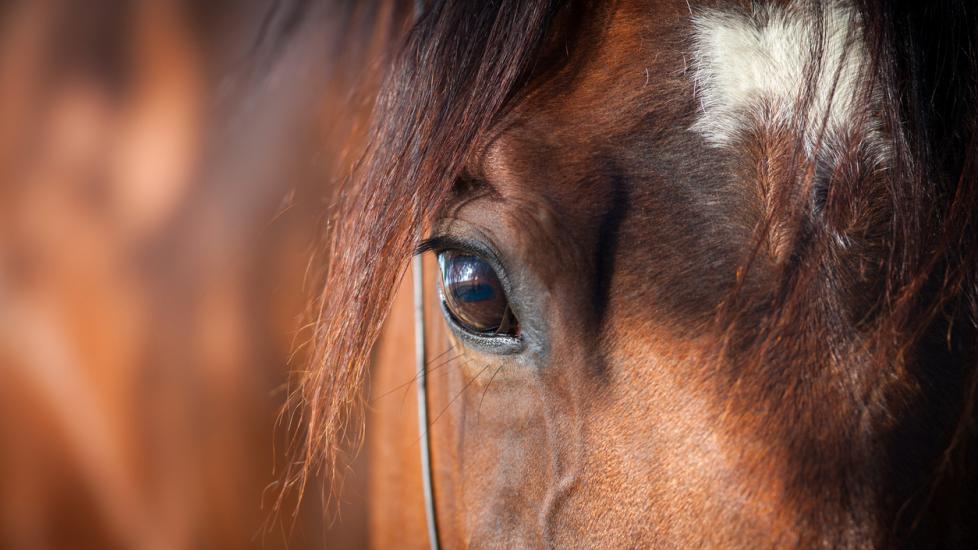Moon Blindness in Horses
iStock/Alexia Khruscheva
What Is Moon Blindness in Horses?
Moon blindness in horses, also known as equine recurrent uveitis (ERU), is an immune-mediated disease, meaning the body’s immune system attacks its own eye. ERU is often characterized but multiple episodes of inflammation of the uveal tract or middle of the eye. It can involve only one or both eyes.
ERU can result in pain and permanent changes within a horse’s eye, including:
-
Glaucoma
-
Cataracts
-
Blindness
Moon blindness is one of the most common eye conditions seen in horses and the leading cause of blindness. Currently 10–25% of horses in the United States will suffer from ERU, with Appaloosas, American Paint Horses, Drafts, and Dutch Warmblood breeds being at higher risk.
Symptoms of Moon Blindness in Horses
Equine recurrent uveitis symptoms in horses include:
-
Squinting
-
Tearing
-
Redness
-
Cloudiness of the cornea (transparent part of eye that covers the iris and pupil and allows light to enter the eye)
-
Constricted pupil
Causes of Moon Blindness in Horses
The underlying cause of uveitis isn’t completely understood, but Appaloosas are 8.3 times more likely to develop it than all other breeds combined, so genetics may play a role.
There are many environmental factors that can affect the onset and severity of uveitis as well, such as infectious organisms like Leptospira spp.
The most common causes of uveitis include:
-
Autoimmune disease
-
Trauma
-
Infection (particularly leptospirosis)
How Veterinarians Diagnose Moon Blindness in Horses
Uveitis is primarily diagnosed through an eye examination by a veterinarian. Diagnosing ERU can be harder and typically happens after several recurrent uveitis episodes.
The vet will look at the structures in the back of the eye for signs of inflammation, such as:
-
Larger blood vessels
-
Bullet hole-like lesions in the retina
-
Changes to the optic disc (small circular area at the back of the eye where the optic nerve enters)
-
Particulates in the vitreous body (fluid within the back of the eye)
If signs of moon blindness recur, your veterinarian may use a tonometer to check for high pressure within the eye to see if your horse may be at risk for secondary glaucoma.
Treatment of Moon Blindness in Horses
Treating moon blindness depends on the primary cause:
-
If a traumatic incident caused the inflammation, pain and inflammation management, such as NSAIDs for your horse, may be all that’s needed.
-
If leptospirosis is suspected, antibiotics such as doxycycline may be needed.
-
Autoimmune cases require regulation of the immune system using topical medications such as cyclosporine or steroids.
-
All cases of uveitis require inflammation and pain management.
-
Medications including phenylbutazone or Banamine® may be recommended by your veterinarian and can be given orally (by mouth).
-
Eyedrops or ointments can be helpful for pain and inflammation; some options include dexamethasone or cortisone-containing ointments, and diclofenac, which is a non-steroidal anti-inflammatory medication.
Some chronic cases of uveitis respond poorly to typical treatment plans. In this case, your vet may refer your horse to an ophthalmologist. Additional treatments by the ophthalmologist may include cyclosporine implants or gentamicin intraocular injections. These implants can provide treatment to the horse for longer periods of time, helping to control the inflammation and prevent recurrences.
In very severe cases where the pain and inflammation cannot be controlled, enucleation (removal of the eye) may be the best option for the horse, especially if the eye is no longer able to see.
Recovery and Management of Moon Blindness in Horses
Ultraviolet (UV) light is known to worsen uveitis cases, so a UV-protective fly mask can be extremely helpful for long-term management, especially in cases of ERU.
Uveitis can predispose a horse to corneal ulcers, glaucoma, and even blindness. This means that being diligent in preventing and managing flare-ups is important for the long-term comfort of the horse.
To prevent moon blindness from developing due to leptospirosis, vaccinate your horse as your vet recommends.
Moon Blindness in Horses FAQs
What are the first signs of uveitis in horses?
Often the first signs of uveitis include squinting, tearing, and holding eye shut or sensitivity to light.
Can you ride a horse with moon blindness?
Horse with moon blindness can still be ridden but it will depend on their eyesight or their ability to adapt to becoming blind if it has progressed. Some horse can adapt to becoming blind fairly well.
Can uveitis in horses be cured?
Traumatic uveitis or cases secondary to leptospirosis infections can be cured. However, cases with autoimmune causes can be managed but are likely lifelong issues.
How long does it take for uveitis to clear up?
Resolution of uveitis will depend on the underlying cause and severity. Some mild cases may resolve in a week to 10 days while others may take weeks to months of treatment.
Is uveitis in horses contagious?
No, uveitis is not contagious.
References
Wahlert, Sarah. Equine Recurrent Uveitis (ERU). Equine Recurrent Uveitis (ERU), UMN Extension.
Young, Amy. Equine Recurrent Uveitis. UC Davis School of Veterinary Medicine, Center of Equine Health. 2022.
